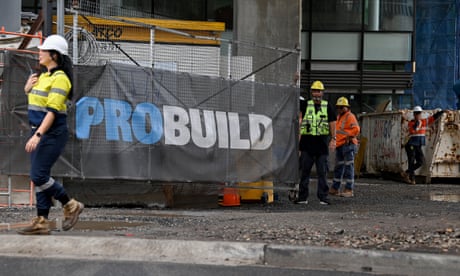- by foxnews
- 08 Apr 2025
‘Not in good shape’: more construction industry collapses could follow Probuild
‘Not in good shape’: more construction industry collapses could follow Probuild
- by theguardian
- 25 Feb 2022
- in news

The collapse of construction giant Probuild could be just the start of financial trouble across the Covid-ravaged industry as it struggles with soaring costs and project delays, the construction sector's peak body warns.
Probuild, which directly employed about 750 people and had annual revenues of more than $1.4bn, was placed into voluntary liquidation by its South African owners Wilson Bayly Holmes-Ovcon (WBHO) late on Wednesday.
Contractors and other workers turned up at sites on Thursday in several Australian cities to collect equipment, including at CSL's $750m proposed new headquarters in Melbourne.
"We are caught up in a set of circumstances not of our making," a Probuild spokesperson said. "We are working closely with the administrator [Deloitte] on a number of plans to protect our clients, subcontractors and employees.
"The Probuild brand is strong and we intend to keep it that way. We have several options for raising the necessary capital to continue as a premium Australian building company. These will all be pursued."
Jon Davies, chief executive officer of the Australian Constructors Association, said ongoing absenteeism because of Covid and rising costs of labour and materials meant more construction firms may soon follow Probuild into administration.
"Everyone assumes that everyone's making bucket loads of money," Davies said, noting city skylines are often dotted with cranes, and governments talk up the accelerated spending on infrastructure as a spur for economic growth.
"The reality is at a higher level the industry is not in good shape," he said. "In fact, probably the more work [contractors] have, the more exposed they are to these risks."
For now, governments show little sign of stepping in. The Morrison government highlighted wider economic data from the Australian Securities and Investments Commission showing 46% fewer companies entered external administrations in 2021 than in 2019.
Probuild itself had also been struggling for some time. In 2020, WBHO entered talks to sell it to China's state-owned China State Construction Engineering Corporation for a reported $300m.
The Australian Foreign Investment Review Board (Firb), however, rejected the proposal after an intervention by the treasurer Josh Frydenberg, citing national security concerns.
Guardian Australia approached Firb and Frydenberg. Spokespeople for both said the government "does not comment on the application of the foreign investment screening arrangements as they apply or could apply to particular cases".
After the Firb rejection, WBHO said it "implemented its strategy to downsize the business, and considered other sales options which proved fruitless due to concerns potential acquirers had as to the impact of the regulatory approach to Covid".
The company, whose motto is "Rely on our ability", said it was "discontinuing financial assistance" as the potential risk for large mega-building projects now "outweighs the current margins available".
Those risks had intensified because of the "Australian government's hard-line approach of managing Covid-19", including border restrictions, snap lockdowns and mandatory work-from-home regulations for many sectors, the company said.
"The impact of lockdown restrictions on the retail, hotel and leisure and commercial office sectors of building markets [has] created high levels of business uncertainty in Australia and [has] significantly reduced demand and delayed the award of new projects in these key sectors of the construction industry."
Davies said construction was Australia's third-largest industry, employing about one in 1o workers. He predicted the wider economy would suffer unless it was placed on a more sustainable footing.
In a statement this morning, Deloitte said 18 related companies within the WBHO Australia group had been placed into voluntary administration on Wednesday night.
"WBHOA has been a major contributor to the construction sector and the broader economy, including as a direct and indirect employer," Sal Algeri, who leads Deloitte's turnaround and restructuring unit, said in a statement.
"The Covid-19 pandemic has created challenging trading conditions for many businesses, and for WBHOA, which has also been impacted by certain loss-making projects.
"Our immediate focus will be to undertake an urgent assessment of the entities' financial positions and work with key stakeholders to stabilise the business and projects where possible."
- by foxnews
- descember 09, 2016
Ancient settlement reveals remains of 1,800-year-old dog, baffling experts: 'Preserved quite well'
Archaeologists have recently unearthed the remarkably well-preserved remains of a dog from ancient Rome, shedding light on the widespread practice of ritual sacrifice in antiquity.
read more


